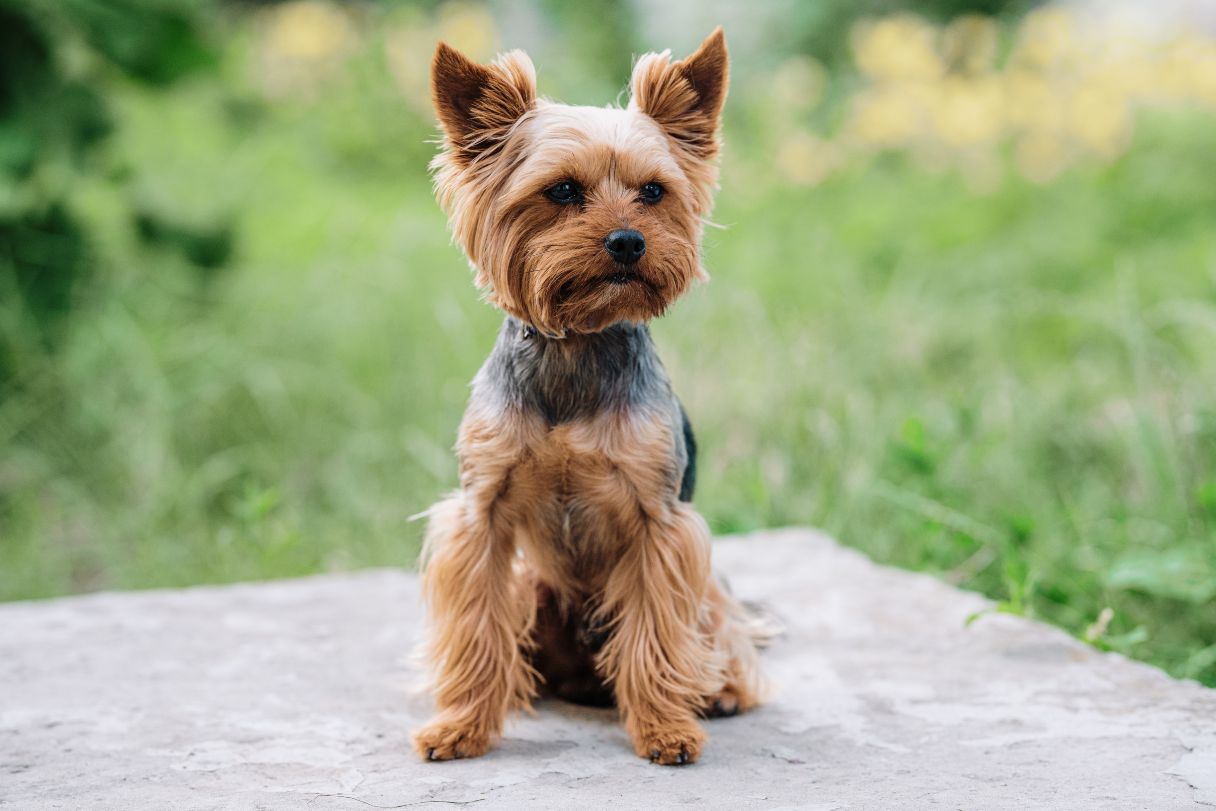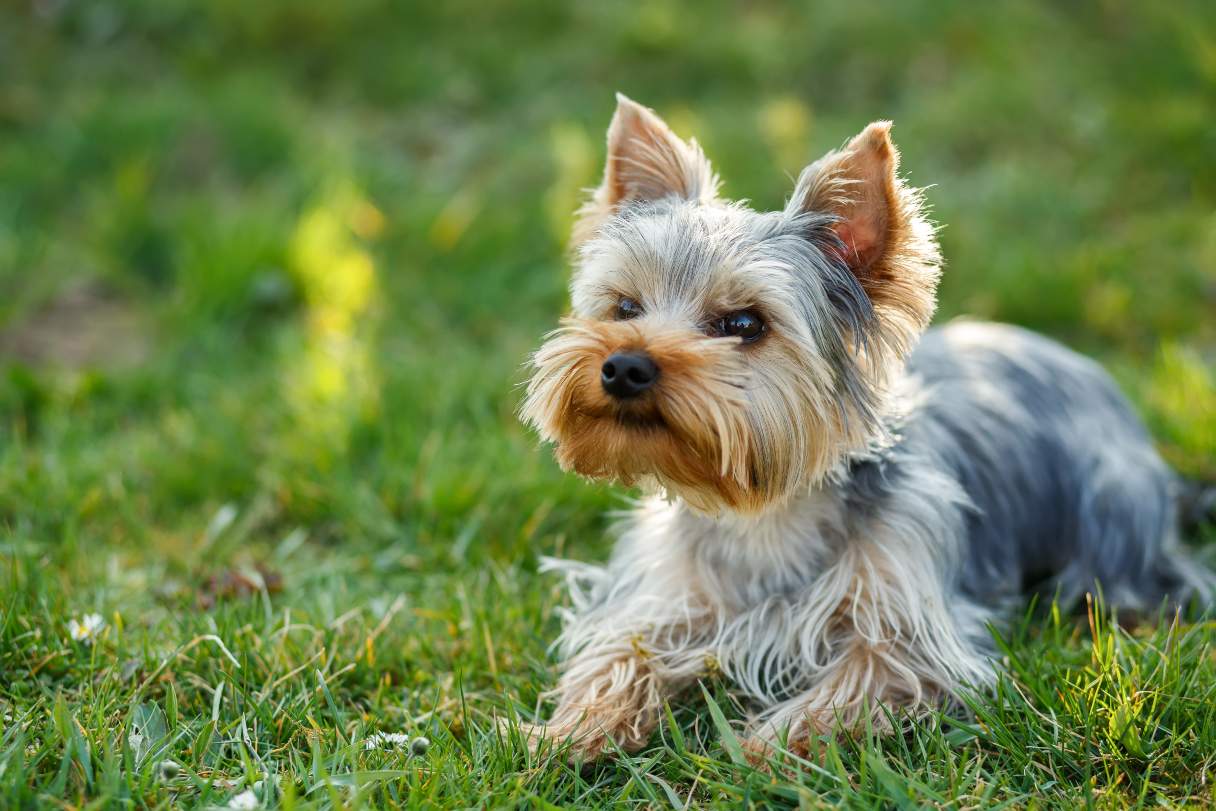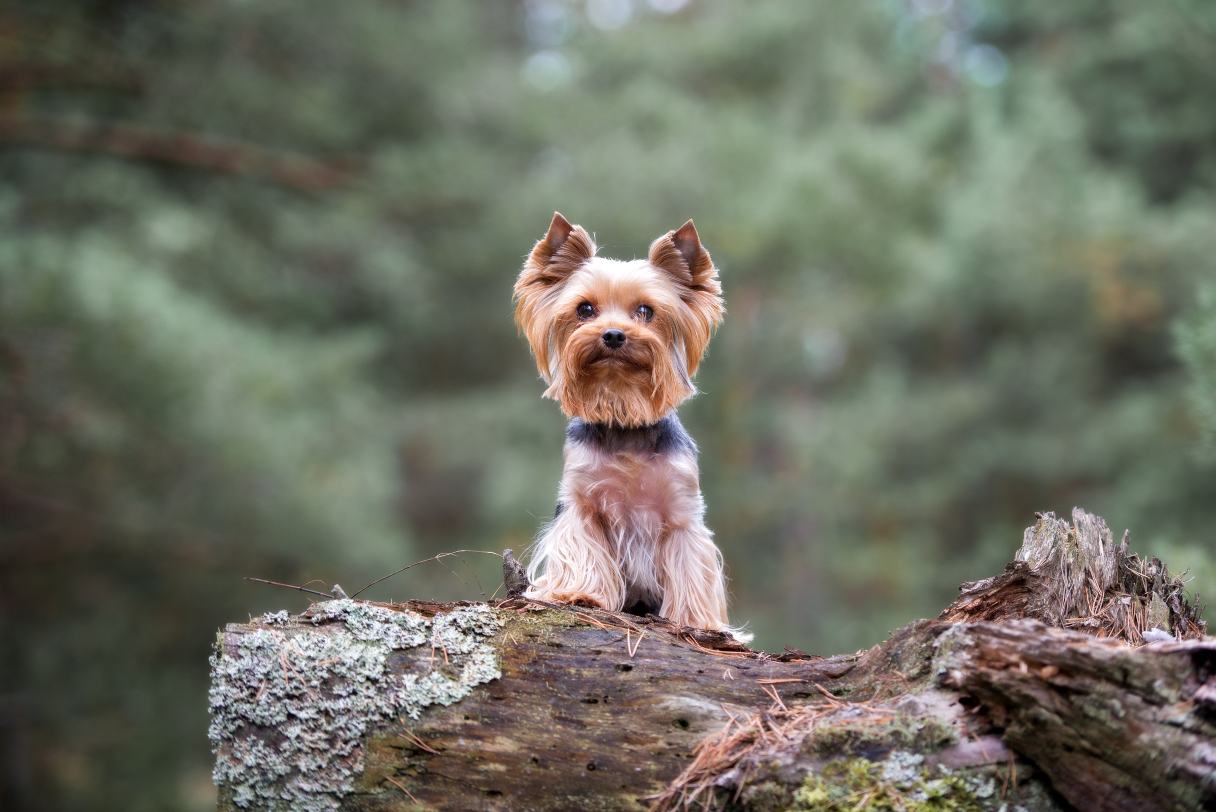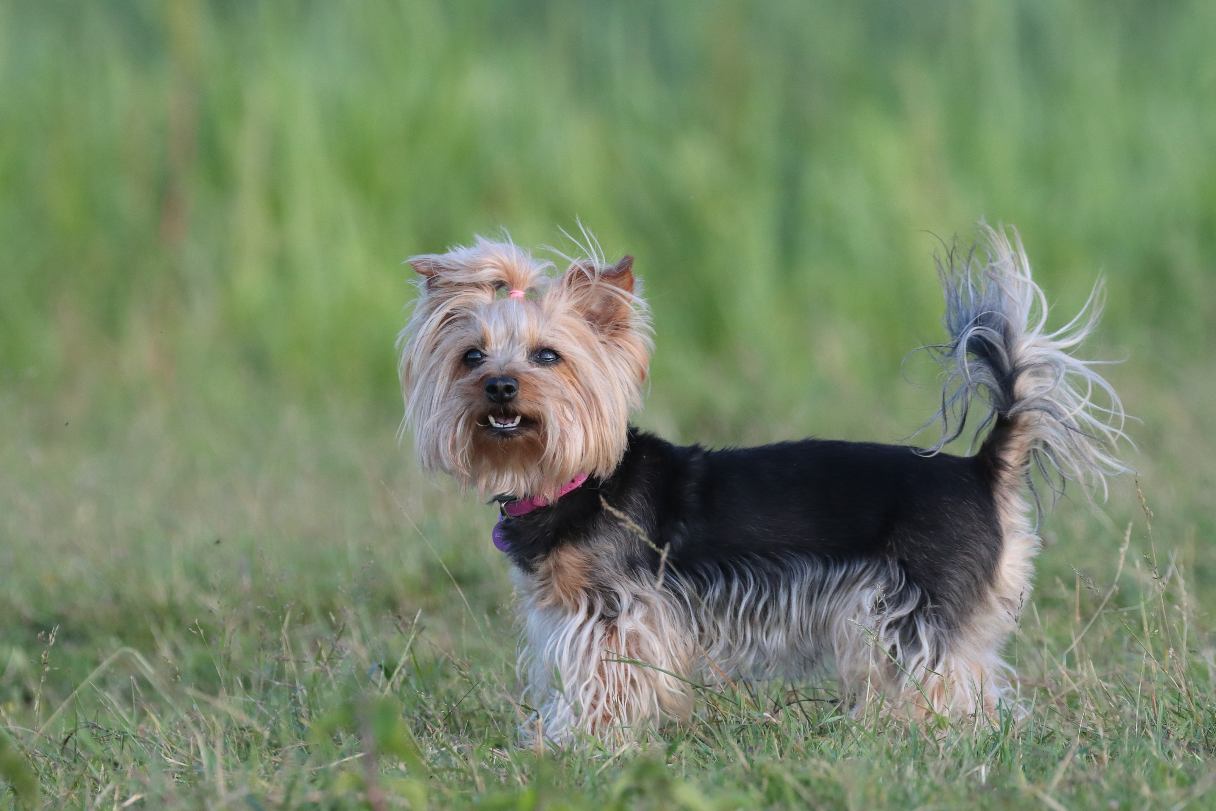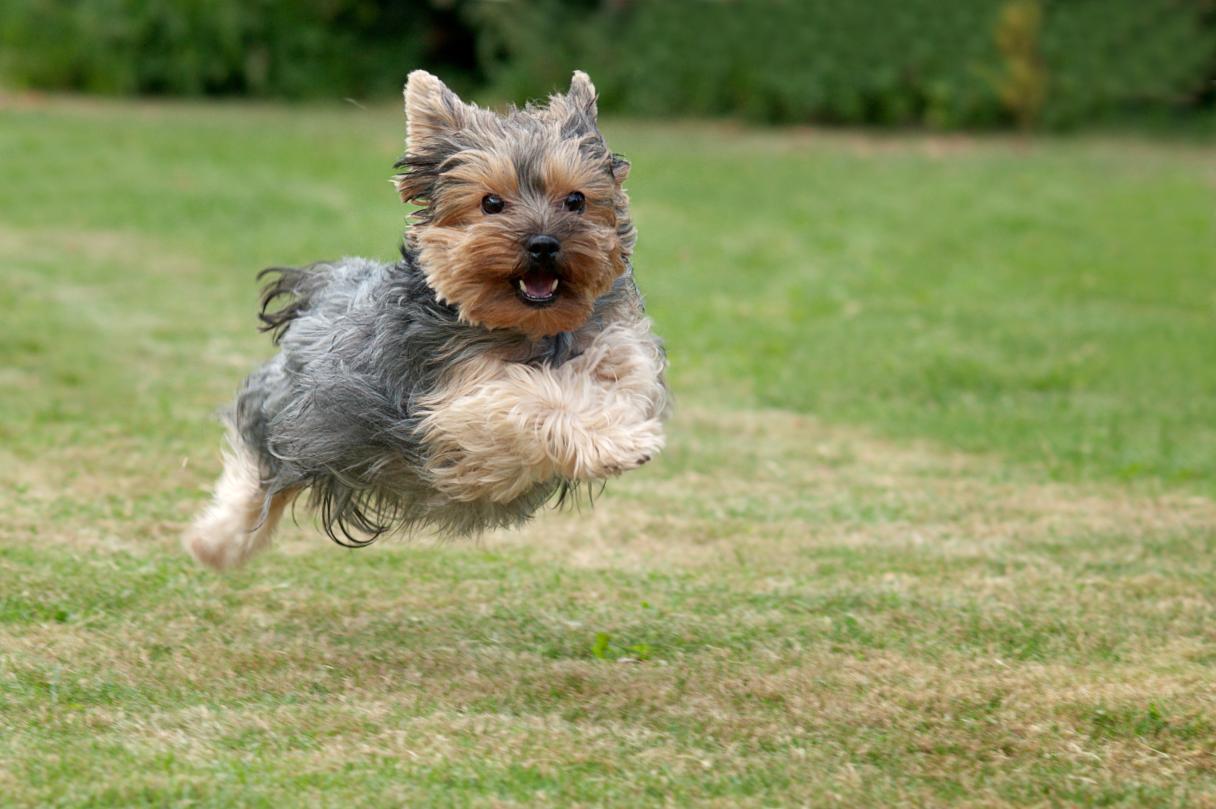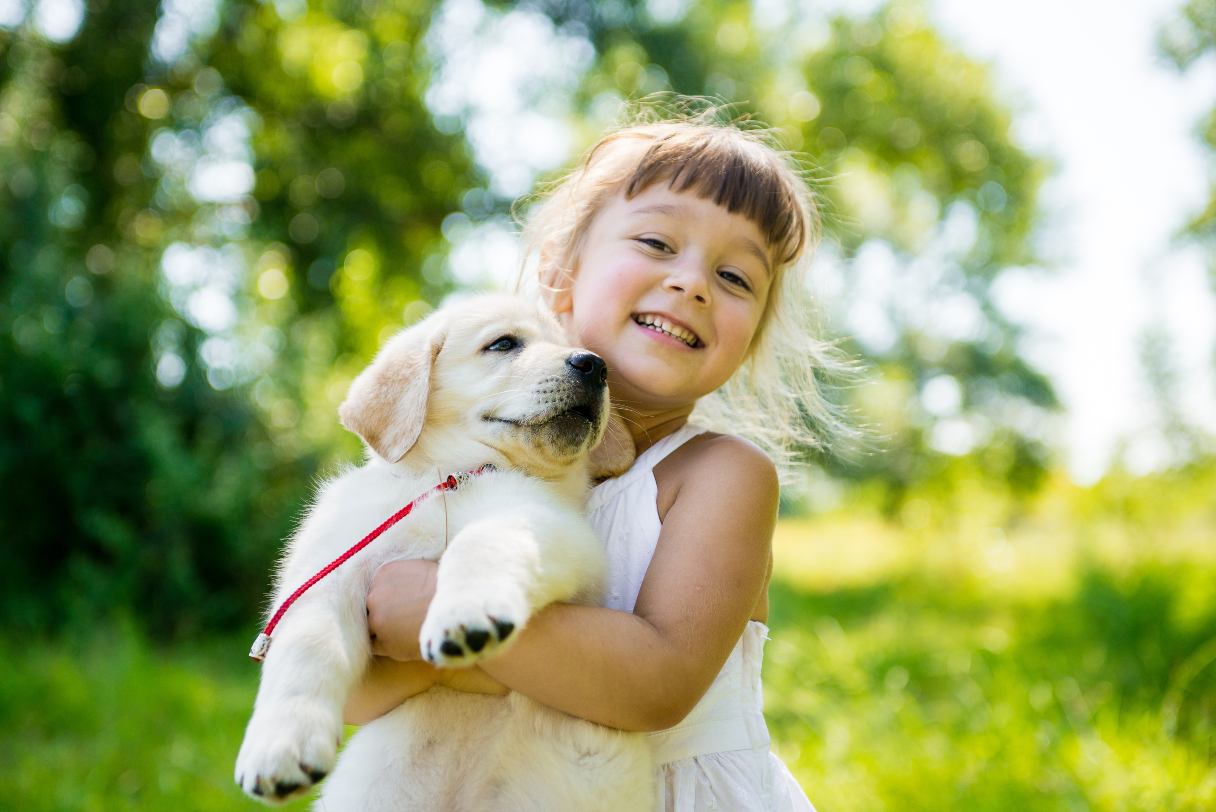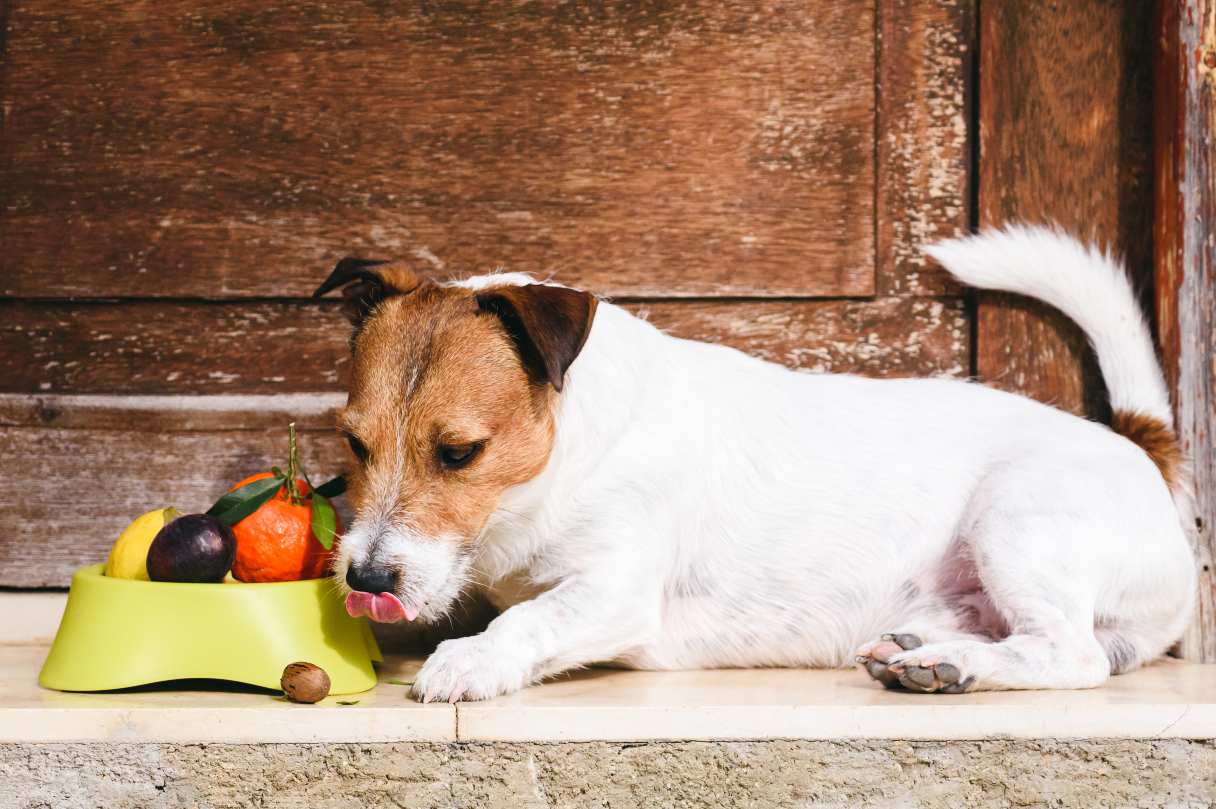Yorkshire terriers, affectionately known as Yorkies, are petite cutie-pies that pack a lot of spunk beneath their dainty exterior. They may look like darling little purse dogs, but they’re terrier through and through, with all of the energy, fearlessness and attitude you’d expect from a larger terrier breed.1
Learn more about the Yorkie’s history and temperament, along with their health and daily care and maintenance needs.
About the Yorkshire Terrier
You wouldn’t know it to look at them, but these tiny, pampered pups actually started out as working-class heroes, bred to hunt and kill small pests in textile mills and mines. They were bred by Scottish mill workers in the Northern England counties of Yorkshire and Lancashire in the mid-19th century.1
Originally known as the Broken Haired Scotch terrier, they were registered as Yorkshire terriers with England’s Kennel Club in 1886. Shortly afterward, these diminutive cuties caught the collective eye of Victorian society ladies and promptly moved up from the mills and mines to parlors and sitting rooms, where they enjoyed lives of laps and luxury.1
To this day, Yorkies remain popular with urbanites all over, but they can still harken back to their working-class roots when called upon to do so. In World War II, a Yorkie named Smoky gained fame accompanying her United States Army pilot owner on air raids, carrying messages to warn of attacks and carrying telegraph lines through narrow pipes. She went on to become the first-ever therapy dog, visiting hospitals to bring smiles to wounded soldiers.2
Added to the American Kennel Club registry in 1885, Yorkies are one of their most enduringly popular breeds, especially among city-dwellers.1
Yorkshire Terrier Appearance
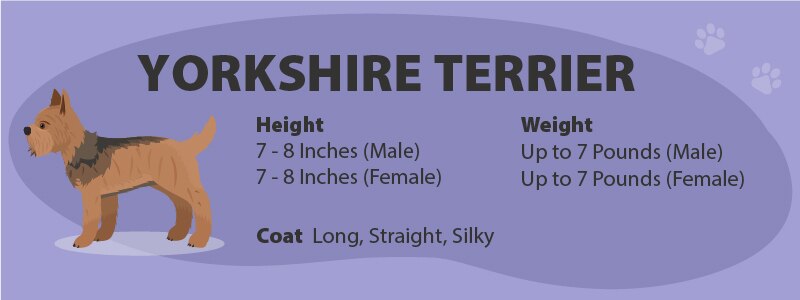
The Yorkie is a tiny toy breed, with both males and females weighing up to 7 pounds and standing a mere 7 or 8 inches tall at the shoulder.1 They’re compact but elegant, with a short, straight back, a small, flat head and a short muzzle with a black button nose.3 The ears are erect and V-shaped, and the eyes are dark and intelligent with a mischievous sparkle.3
Yorkies are best recognized by their distinctive blue-and-tan coat of long, straight, silky hair.3 Show dogs wear their coats long enough to sweep the floor, with hair parted in the middle and hair over the eyes pulled into a top knot.3 Most pet Yorkies are kept in a puppy clip, with the hair trimmed short all over the body and worn a bit longer on the muzzle and around the eyes and ears.4
Puppies are born mostly black with tan markings on the face and legs; but by adulthood, the black fades into a rich steel blue and is confined to the back, from the back of the neck to the tail. The head, chest, legs and undercarriage are various shades of tan.3
Yorkshire Terrier Temperament
One word that’s consistently used to describe the Yorkie temperament is feisty. This tiny breed is assertive and won’t be pushed around by bigger dogs or people. But despite their big-dog attitude and confidence, Yorkies are also affectionate little love bugs with a silly, playful streak that never fails to charm. With all that terrier energy, they need plenty of exercise to burn it off, but then they’re ready to curl up in your lap and be your buddy while you work or watch TV.1
Yorkies can be a bit stubborn, but they’re smart and eager to please their people, which makes them fairly easy to train. They respond best to positive reinforcement with lots of rewards and praise. Early obedience training and lots of socialization will prevent them from becoming fearful and help ensure they grow up to be happy and friendly.1
Despite their general friendliness, Yorkies are alert and vigilant watchdogs who will bark at strangers and strange noises.1 Some people find their barking to be too much. Socialization to desensitize them to noises, plenty of exercise and interactive toys and puzzles to prevent boredom can help cut down on excessive barking.5 Leaving the TV or radio on when you leave can mask triggering sounds and help keep a yappy Yorkie from annoying the neighbors while you’re gone.5
Living With a Yorkshire Terrier
As charming and adorable as Yorkies are, they’re not the best dog for everyone. Here’s what it’s like to live with and care for a Yorkie so you’ll know whether this breed is a good match for your home and lifestyle.
Who they’re best for
A Yorkie needs an owner who finds their brash attitude cute and charming and who can handle their big-dog energy and barking tendencies. This isn’t a dog who will just curl up and sleep all day or be seen and not heard.6
Yorkies are highly affectionate and tend to get along well with children, provided the children are taught to be gentle with these fragile little pups. Very young children shouldn’t be allowed to hold or handle them without close adult supervision.1
Yorkies can get along well with other pets, although they may try to assert dominance even with much larger dogs, which may lead to fights that they can’t win. And their instincts as mouse and rat hunters might make them a danger to hamsters and other domesticated rodents.7
Living space
Yorkies are highly popular with city and apartment dwellers, but these are adaptable pups who can do equally well in the country or the suburbs. They don’t take up a lot of space, and they can make ideal apartment dogs for someone who can rein in their barking tendencies.7
A fenced yard will help keep your Yorkie safe when they’re outdoors. Otherwise, they should be leashed or carried when outside for their own safety.7
Exercise and activity
Yorkies have a lot of energy, but as small dogs, they don’t need a great deal of exercise to stay fit and happy. A couple of short, leisurely walks around the block each day — allowing them to sniff around, do their business and say hi to the neighbors — will meet most of their exercise and mental stimulation needs. Some vigorous games of fetch in the backyard or chasing toys around the home can fill in the gaps.1
Thanks to their ratting-dog breeding, some Yorkies have a tendency to dig after moles and other underground rodents. Earth dog sports, which are designed to let small terriers hunt rodents in a way that’s safe for all animals involved, can provide an excellent outlet for their hunting instincts and help reduce their drive to dig up your petunias.8
Grooming
The Yorkie coat is made of hair that’s very similar to human hair, and it requires the same type of daily maintenance. That means daily brushing and weekly baths with special shampoo and conditioner, especially if you keep your Yorkie in a long show cut. Because it keeps growing, it must also be trimmed regularly.4
Most Yorkie owners who don’t plan to enter their pups in dog shows opt for a puppy clip, which doesn’t require quite as much maintenance — brushing several times a week instead of daily and bathing every other week instead of weekly. Regular trips to the groomers will be needed to maintain their shorter haircut, unless you opt to do it yourself at home. While that sounds like a lot, bathing and grooming your Yorkie can be an excellent opportunity for quality bonding time.4
Additionally, a Yorkie’s ears should be inspected weekly for debris or signs of infection.1 Their nails should be trimmed once or twice a month.4 And as a toy breed, regular toothbrushing is essential to maintain healthy teeth and gums.4
Yorkshire Terrier Health and Life Expectancy
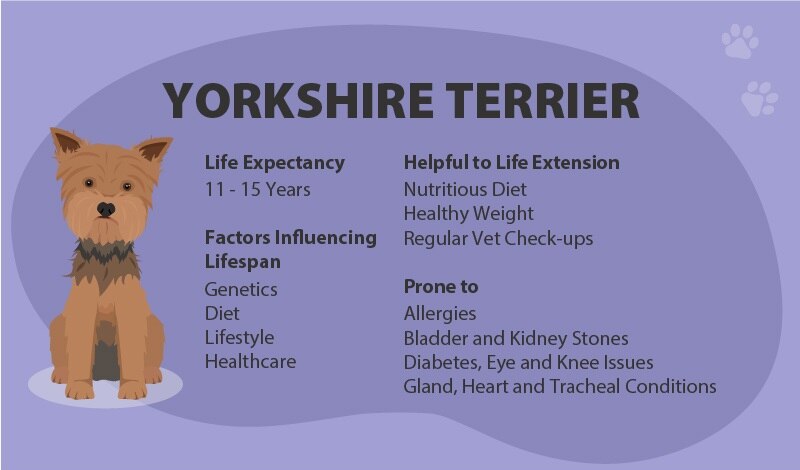
The average lifespan for Yorkshire terriers is 11 to 15 years.1 But a lot of different factors influence an individual dog’s lifespan, including genetics, diet, lifestyle and healthcare. A nutritious diet, healthy weight management and keeping up with regular vet checkups can do a lot to help your pup live a longer, healthier life.
Yorkies do best on small-breed dog food that is formulated for their current life stage. Toy breeds need more calorie-dense food than large dogs, and they also have special nutritional needs that support their specific health concerns and their tendency to live longer. Small-breed dog and puppy food are designed to meet those needs, as well as being easier for tiny mouths to chew.9
Yorkies are generally healthy and long-lived dogs, but they’re still prone to a few health conditions that Yorkie moms and dads should be aware of, many of which are common to toy breeds:
Allergies
Some Yorkies are prone to seasonal and environmental allergies, which can be triggered by mold, pollen and dust. These can cause itchy and inflamed skin, which can be worsened by chewing, licking and scratching. If you have an itchy pup, you can ask your vet about a number of available remedies, including medicated shampoos, over-the-counter antihistamine drugs and prescription medications.10
Bladder or kidney stones
Yorkies may be prone to developing stones or crystals in their bladder or kidneys. Signs include blood in the urine and straining to pee. If you notice these, you should have your pup checked out by a vet as soon as possible.10
Cushing’s disease
Cushing’s disease is the result of overproductive adrenal glands, and it can be serious if it’s not treated. Initial signs include excessive thirst and urination, excessive hunger and decreased energy. As the disease progresses, additional signs include thinning hair, thin skin that’s more damage-prone and a pot belly. If it’s caught early enough, Cushing’s can be managed with oral medication.10
Diabetes
Yorkies have higher-than-average incidences of diabetes mellitus, which is an inability to regulate blood sugar and insulin. Symptoms include increased hunger, thirst and urination, as well as unexplained weight loss. This is a serious but manageable condition with excellent outcomes if treatment protocols are followed, but it requires a lot of daily care and vet visits.10
Eye problems
Yorkies may be prone to certain eye health issues. These include:10
- Cataracts. A cataract is an opaque film that develops over the surface of the eye and obscures vision. Depending on the severity, cataracts can cause partial or total blindness. But in dogs who are good candidates for surgery, they can usually be removed.
- Dry eye. Also known as keratoconjunctivitis sicca (KCS), this occurs when the tear glands can no longer produce enough fluid to keep the eye moist, which results in itchy, irritated eyes that are more prone to infections. Signs include thick mucus discharge and dull-looking eyes, as well as squinting and rubbing the eyes. This condition can be managed with a topical eye ointment that your dog will need for the remainder of their life.
Heart problems
Yorkies have a propensity toward a couple of different heart problems:10
- Patent ductus arteriosus (PDA). This is a congenital heart defect in which a blood vessel connecting two sections of the heart muscle fails to close after birth, which causes fluid buildup in the lungs and strain on the heart. It may cause your pup to develop a heart murmur, and more obvious signs include coughing, shortness of breath, getting tired quickly during exercise and hind limb weakness. Surgery might be able to close the vessel and correct this condition.
- Heart failure. This is a form of heart disease that develops in older dogs and is the leading cause of death in senior Yorkies. It occurs when a weakening or wearing down of the muscle walls of the heart causes it to have to pump harder, allowing blood and fluid to leak back into the heart. Symptoms are the same as with PDA but may also include fainting or collapse. When diagnosed early enough, it can be managed for months to years with a combination of medications that reduce strain on the heart.
Luxating patella
This is the medical term for a chronically dislocating kneecap. This condition is common to small dogs and is often mild enough that it doesn’t cause any mobility issues, although it can lead to arthritis later in life. More severe cases might be fixable with surgery.10
Tracheal collapse
It’s not uncommon for Yorkies and other toy breeds to have weak or malformed cartilage supporting the windpipe, which can collapse randomly, making it difficult to breathe. This usually triggers coughing episodes. Mild cases may be treated with medication, but severe cases may need surgery to help your pup keep breathing.10
Buying or Adopting a Yorkshire Terrier
Depending on where you live, you can find ethical breeders selling Yorkshire terrier puppies for prices ranging from $1,500 to $3,500.11 Puppies from championship bloodlines tend to cost more. It’s important to research any breeders you’re considering to make sure they adhere to responsible breeding practices and screen for genetic health issues.
Yorkies and Yorkie mixes of all ages may be available to adopt from pet shelters and Yorkshire terrier rescue organizations. One such organization, the Yorkie Rescue of America, specializes in rehabilitating and finding forever homes for Yorkies with special needs, medical issues and histories of abuse or neglect. Adoption fees or requested donations at various Yorkie rescues tend to vary according to the needs and care requirements of the individual dog or puppy, but they can run from $150 to $800 or more.12
Frequently Asked Questions About Yorkshire Terriers
Do you still have questions about Yorkshire terriers? Here are answers to some commonly asked questions about this dog breed.
CareCredit Credit Card Financing for Dogs
Taking good care of your pet's well-being from nose to tail is essential. Make sure to stay up to date on their regular checkups at the vet to help keep your pet happy and healthy for a lifetime of love. You can use your CareCredit credit card for pet care throughout the year for routine veterinary services as well as emergencies and surgeries.* Use our Acceptance Locator to find a veterinarian near you that accepts CareCredit.
CareCredit is there for you and your pet every step of the way; continue your wellness journey by downloading the CareCredit Mobile App to manage your account, find a provider on the go and easily access the Well U blog for more great articles, podcasts and videos.
In addition to pet care, you can also use your CareCredit credit card for dentistry, cosmetic, vision, hearing, health systems, dermatology, pharmacy purchases, spa treatments and so much more within the CareCredit network. How will you invest in your health and wellness next?
Author Bio
Jean Marie Bauhaus is a freelance writer and novelist who has been writing pet content since 2013. Her work has appeared on Forbes.com, Hill's Pet, Chewy, AKC.org and more.



